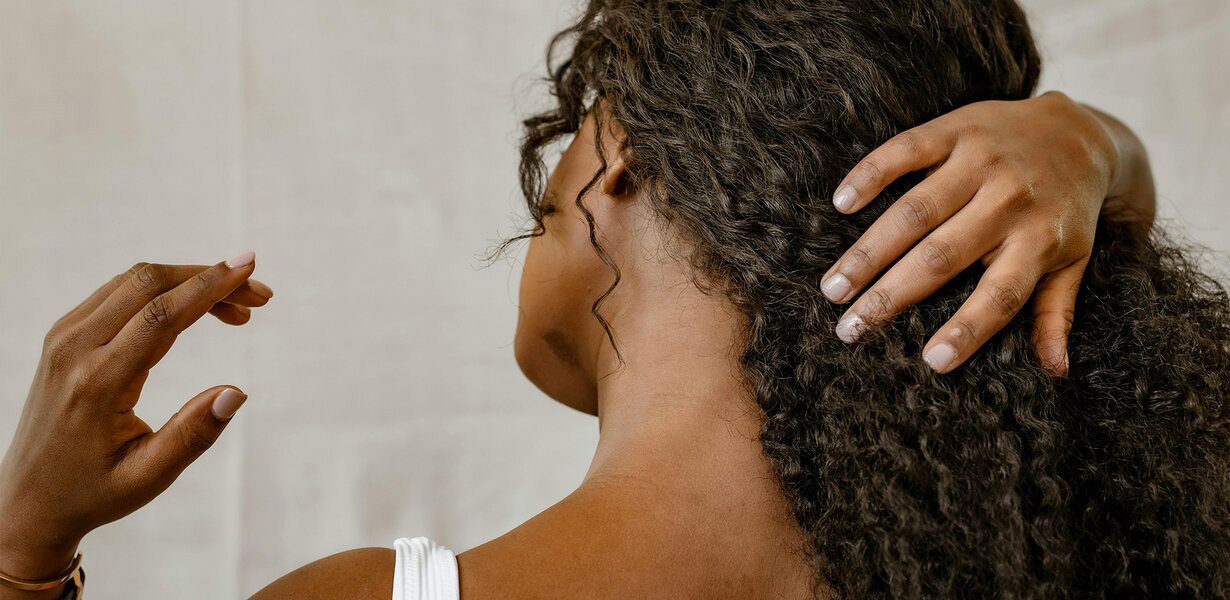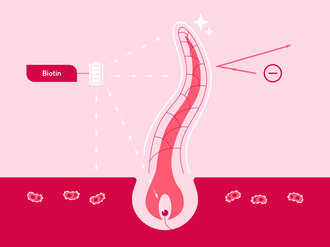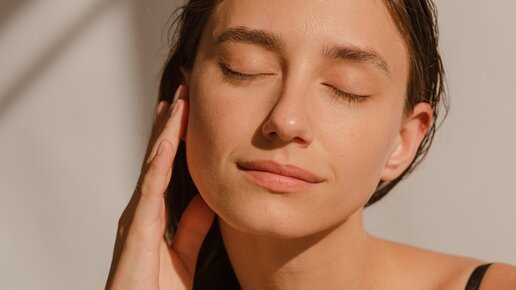Beauty has many faces. However, we are all attracted to beautiful skin and shiny hair. In our everyday use of language, we like to use the phrase “beauty comes from within”. So easily said, there is more to this idiom than you would believe: Whereas external applications such as creams, masks, etc. soon reach their limits, care with vital substances provides beauty from the inside out. This is how selected vitamins and minerals contribute to the structure and regeneration of skin and hair. If used in a targeted fashion, internal nutritional care can help us to maintain our vital strength and beauty for as long as possible. This is where biotin, a well-known beauty nutrient, comes into play.
What is biotin?
You may know biotin by one of its many names: vitamin B7, vitamin H or simply the ‘beauty vitamin’. No matter what you call it, one thing is certain: this water-soluble B vitamin is essential for your body. Since your body cannot produce sufficient amounts of it itself, it must be obtained through food or supplements.
And why is biotin actually called vitamin H? Quite simply because it contributes to the maintenance of normal hair.
Biotin effects – not just for skin, hair and nails
As an essential component of enzymes (coenzymes), biotin is involved in many cellular metabolic processes – not least in the metabolism of macronutrients (proteins, fats and carbohydrates). It also contributes to energy metabolism and supports the normal functions of the mind and nerves. If you come across vitamin B7 on the internet and in newspapers, this will generally be in the context of beauty, because this vitamin helps maintain normal skin structures and makes a valuable contribution to the preservation of beautiful hair – and this applies to both the hair on the head and to facial hair (beards, etc.).

Shiny, strong hair – who wouldn't want that? In fact, a study found that people with androgenic hair loss often have lower biotin levels in their blood. And many report positive effects when they take biotin supplements. No wonder it is considered THE hair vitamin par excellence!
How does biotin support the skin?
As an essential coenzyme, it plays a key role in fatty acid and amino acid metabolism – both of which are crucial for healthy, radiant skin. Studies show that biotin supports the skin's moisture balance and contributes to the stability of the skin barrier.
Biotin with selenium and zinc
When it comes to hair, skin and nails, biotin, selenium and zinc are a real dream team. Their functions overlap and together they can optimally support your natural beauty. The perfect combination for strong nails, radiant skin and strong hair!
Zinc and selenium play a special role here: as antioxidants, they help protect your cells from oxidative stress – an effect that is often first visible on the skin – and also on the scalp. And zinc? It also plays a key role in cell division, a central process for healthy, vital structures.
Where is biotin found? These foods are sources of biotin:
Biotin is found in a variety of foods, but usually only in small amounts. This makes it all the more important to eat a balanced diet that regularly replenishes your reserves. Foods that contain biotin include:
- Egg yolks
- Yeast and offal such as liver
- Plant-based foods such as nuts, lentils, oatmeal and unhusked rice.
Intake & dosage: How much biotin does your body need?
How much biotin per day?
The German Nutrition Society recommends a daily biotin intake of 30 to 60 micrograms for adolescents aged 15 and above and adults – a guideline based on estimates. Why? Because the actual requirement has not yet been clearly determined.
Who needs extra biotin?
In most cases, a balanced diet ensures a good supply. However, unbalanced diets or regular alcohol consumption can increase your requirements. Want to be on the safe side? Then have your biotin levels checked in a laboratory – that way you'll know exactly where you stand.
When should I take biotin?
Whether in the morning, at lunchtime or in the evening: biotin can be taken at any time of day. However, it works best when you take biotin capsules before or with a meal and with sufficient liquid.
How long should I take biotin?
When taken in appropriate doses, there are no known negative effects of long-term biotin supplementation. If you want to be sure whether and for how long your body needs additional biotin, a simple laboratory test can provide information about your biotin status.
Recognising biotin deficiency and its symptoms
Our bodies often send subtle signals when something is missing – including biotin. An insufficient supply of this B vitamin can manifest itself in many different ways. If you notice the following symptoms, it may be a good idea to check your biotin status:
- Loss of appetite
- Persistent tiredness or general weakness
- Dry, flaky skin
- Dull or dry hair
- Brittle nails
A biotin deficiency does not always manifest itself immediately. It often goes unnoticed for a long time because there are no clear signs or they are non-specific. So if you want to ensure that your body is getting the nutrients it needs, don't just rely on your gut feeling – a laboratory test will give you certainty. This will allow you to react early and specifically support your nutrient intake.
For your convenience, we have compiled a table for you. It shows how the measured values can be classified – from deficient to normal values:
| Normal values | 300 – 1000 ng/l |
| Lower normal range / borderline supply | 200 – 300 ng/l |
| Suboptimal supply | 200 ng/l |
| To be noted before blood collection | 12 h fasting Discontinue existing biotin preparations a few days prior to blood collection |
Biotin & thyroid: What you should know
If you are due for a thyroid examination and are taking biotin, you should be careful: Laboratory tests are often based on a procedure in which biotin plays a role. This can distort the results – either too high or too low. Our tip: Talk to your doctor and stop taking biotin a few days before the test to be on the safe side.
Biotin during pregnancy – what to look out for?
During pregnancy and breastfeeding, biotin metabolism changes, increasing the body's need for this nutrient. A high-quality pregnancy multivitamin will usually provide you with sufficient biotin. If you are considering taking an additional biotin supplement, consult your doctor about the dosage.
Conclusion: Biotin deserves more attention – not only in the context of beauty, but as a genuine everyday companion for your well-being.
FAQ – Your questions about biotin
Biotin is known as THE vitamin for skin, hair and nails – but it can do even more! It supports energy metabolism and contributes to normal nerve and mental function. A real all-rounder for your well-being!
Hair loss can have many different causes. Consult a doctor to find out where your problems in this area come from. Depending on the reason, biotin can be a valuable support. The daily requirement should be met in any case, but significantly higher amounts can also be used. For a temporary biotin treatment, 2500 µg per day is a good choice.
You can expect to see the first visible effects after 3 to 6 months.
Biotin contributes to normal energy metabolism and supports the utilisation of fats, carbohydrates and proteins.
There are repeated claims that biotin could have a negative effect on body weight. However, a look at the scientific literature shows that there is no conclusive evidence for this theory.
Nutrient requirements are generally increased during pregnancy, which may also be the case for biotin. A good multivitamin supplement for pregnant women usually covers this reliably.
Biotin plays an important role in hair metabolism, so targeted supplementation can have a positive effect on hair health.
This assumption persists, but there is no scientific evidence to support it. On the contrary, one study shows that biotin can even have a supportive effect in people with acne who are being treated with isotretinoin.
Sources
Mohamed El-Esawy, F. et al. Serum biotin and zinc in male androgenetic alopecia. J Cosmet Dermatol. 2019 Oct;18(5):1546-1549.
https://pubmed.ncbi.nlm.nih.gov/30714301/
Aksac, S.E. et al. Evaluation of biophysical skin parameters and hair changes in patients with acne vulgaris treated with isotretinoin, and the effect of biotin use on these parameters. Int J Dermatol. 2021 Aug;60(8):980-985.
https://pubmed.ncbi.nlm.nih.gov/33682085/
https://www.deutsches-schilddruesenzentrum.de/aktuelle-mitteilung-vitaminpraeparat-biotin-kann-schilddruesenwerte-verfaelschen/; abgerufen am 27.02.2025
Trüeb, R. M. 2016. Serum Biotin Levels in Women Complaining of Hair Loss. Int J Trichology. 8(2):73–7.












